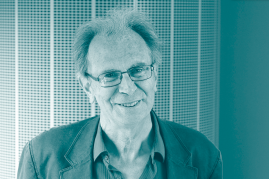
John Urry Memorial Prize 2020
Andrew Baldwin, Christiane Fröhlich and Delf Rothe are being awarded for their contribution to their Special Issue on Anthropocene Mobilities
Andrew Baldwin, Christiane Föhlich and our team member Delf Rothe have been awarded for the Introduction of their Special Issue with the Title „From Climate Migration to Anthropocene Mobilities: Shifting the Debate“ (Vol 14, No, 3) as the most significant contribution to Mobilities published in 2019. By connecting contemporary discussions on the ontology of the Anthropocene with a framing of mobilities and different perspectives on migration politics, the awarded article, according to the jury, furthers critical social thought on the Anthropocene and develops a novel perspective at one of the most pressing issues of our time. The John Urry Memorial Prize s being awarded annually by the Editors of the Journal Mobilities in honour to its founding Editor and Sociologist from Lancaster University John Urry and his research in the field of mobility studies.
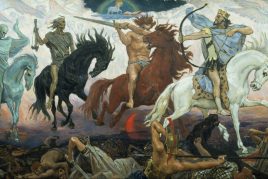
New EISA Section International Relations in the Anthropocene
Call for Papers for this year’s EISA conference in Malta
For the next three years 2020-2022, the European International Studies Association (EISA) has a new semi-standing section on „International Relations in the Anthropocene“. During the first two years the section will be chaired by David Chandler (University of Westminster) and Delf Rothe (IFSH Hamburg). For this year’s Pan-European Conference on International Relations (16 to 19 September in Msida at the University of Malta) we welcome proposals for papers, panels and roundtables that address the challenges of the Anthropocene for International Relations (broadly construed). The call for papers, which is open until March 16, as well as more detailed information about the conference can be accessed here.
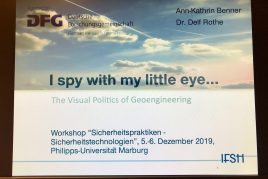
New Publication: Violent Climate Imaginaries
Science-Fiction-Politics. IFSH Research Reports, No.1, 2019.
Our team members Ann-Kathrin Benner and Delf Rothe have published a research report on Violent Climate Imaginaries together with colleagues Sara Ullström and Johannes Stripple from the University of Lund. The article discusses how violent imaginaries of climate change are produced and how they spread in the fields of science, popular culture and politics. Furthermore, it studies how climate change operates as a source or even a form of violence and to what extend imaginaries of climate change can exert violence themselves. The Research Report is the outcome of an ongoing cooperation between the Universities of Hamburg and Lund and the interdisciplinary workshop on „violent climate imaginaries“ that took place at the IFSH from 11-12 February 2019.
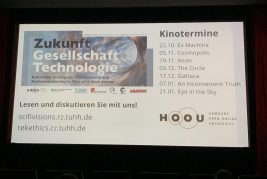
An Inconvenient Truth
Film screening and public discussion at the Abaton Cinema in Hamburg
On January 7, 2020, documentary movie „An Inconvenient Truth“ (Guggenheimer 2006) was screened at the Abaton Cinema in Hamburg as part of the movie/lecture series Future, Society and Technology. Following the movie screening, Delf Rothe and Beate Ratter, who is professor of geography and climate research at the University of Hamburg, discussed about the movie, the current state of the climate regime, the role of technology and of images in global climate politics. The lecture series is organized by the Hamburg Open Online University and consists of seven movie screenings dealing with issues including Artificial Intelligence, drone warfare, globalization, surveillance and climate change.

New publication: Governing the End Times?
Open Access article on the apocalyptic imaginary of the Anthropocene published in Millennium
The article, which was published online first on December 12, 2019, argues that the anthropocene is basically a secular form of eschatology – the Christian doctrine of the end of times. Drawing upon a linear notion of time and addressing the problems of irreversibility and extinction, it draws on key symbols and images of the Christian apocalypse. Engaging with the emerging debate on planet politics, the article identifies three competing discourses on the Anthropocene and related planet political projects: eco-catastrophism, eco-modernism and planetary realism. Each of these projects takes a different position towards the threat of the end of times. The political implications of these are discussed in the article.

Paper presentation
I spy with my little eye: The Visual Politics of Geoengineering
Ann-Kathrin Benner and Delf Rothe presented their paper on the Visual Politics of Geoengineering at the workshop on „Scenarios and the Politics of Future and the Climate Security Nexus“, 14-15 November 2019 at the University of Hamburg. Two weeks later they discussed the same paper at the workshop „Security Practices and Security Technologies“ at the University of Marburg, 5-6 December 2019. The workshop was organized by the research group „Critical Security Studies“ of the German Political Science Association (GPSA).
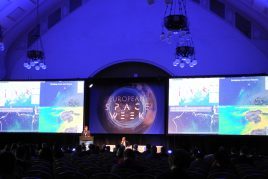
European Space Week
Field research on the EU’s space programmes
Delf Rothe and Ann-Kathrin Benner attended this year’s European Space Week in Helsinki from December 3rd until December 5th 2019 to conduct field research. The European Space Week is an annual event hosted by the European Commmission. This year’s four central themes were the „role of space solutions for strengthening the EU’s position as a global leader in climate action“, „new space economy for sustainable growth“, „sustainable space economy“ and „space solutions for sustainable Artic“. A Hackathon, a bootcamp for startups, panel discussions with members of the European Commission and EU Copernicus, and the „Space Oscars“ cerenomy provided a fruitful atmosphere to engage with matters of governing and securing complex risks by means of satellite imaging and remote sensing.
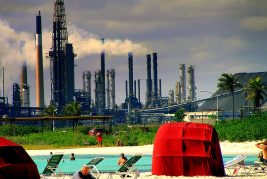
Climate Migration Myths
Commentary in Nature Climate Change
A group of 31 international scholars, including our team member Delf Rothe, have published a commentary in Nature Climate Change that problematizes existing research on climate-induced migration. By reproducing generalized narratives about large-scale climate migration, existing research risks fueling anti-migration sentiment and thus involuntarily playing into the hands of right-wing political actors. The researchers make the case for a mobility lense on climate-migration – one that accounts for the complexity and context-dependency of climate change and migration links.
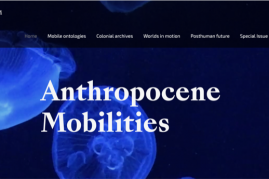
Launch of Anthromob.space
New web platform on migration and environmental change is now online
Anthropocene mobilities is an international network of scholars and experts who collectively discuss the question of how to address the phenomenon of mobility through the lens of the Anthropocene. Anthromob.space is a new online platform to facilitate debates about these issues through short intervention pieces, video interviews, and visual interventions on this topic. The webpage lets you explore the richness of human and non-human stories of mobility and migration in four interactive episodes: mobile ontologies, colonial archives, worlds in motion and posthuman future(s).
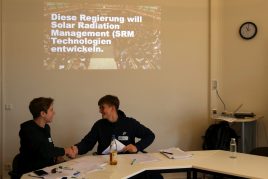
Debating Club on Climate Engineering
Students discuss opportunities and perils of Solar Radiation Management
From September 22-24, 2019, our team hosted a Debating Session on Solar Radiation Management (SRM) with high school students from Hamburg and Buxtehude. Simulating a debate of the British House of Commons, the pupils discussed whether SRM technologies should be developed. While the first group visiting found the arguments of the government more convincing, the second group decided that SRM is too risky and potentially harmful for socio-environmental systems. A team of journalists from each group tweeted live from the debate via @anthroposec. The event took place in the framework of the Hamburg Climate Week.
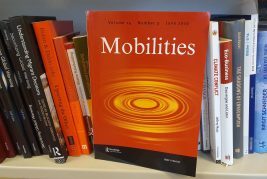
New Special Issue Anthropocene Mobilities
The Special Issue Anthropocene Mobilities has been published in the Journal Mobilities (Vol. 14, Issue 3).
Christiane Fröhlich, Andrew Baldwin and Delf Rothe co-edited the issue, which seeks to develop a new perspective on environmental change and migration in an age of increased mobility. The five research articles and four forum contributions discuss mobility as a key ontological feature of the Anthropocene, scrutinize the entanglement of human and non-human forms of mobility and thereby trouble the existing discourse on climate refugees.
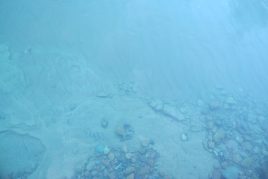
Presentation at the EPSE Summer School
Presentation on Violent Imagineries of Climate Change at the Eurasian Peace Network (EPSE) Summer School
Ann-Kathrin Benner gave a presentation on „Violent Imagineries of Climate Change“ at the 2019 Summer School of the Eurasien Peace Exchange Network. Funded by the Norwegian research council, this summer school took place in Bishkek, Kyrgyzstan from 3rd until 9th June 2019.
In the discussion following the presentation, participants pointed out the ambiguity of violence as a concept from an anthropological point of view and confronted the imagineries in the presentation with collected stories about future (non-)impacts of climate change from their professional backgrounds and everyday lives.

Entering the Anthropocene
Exhibition and public panel at the artspace Âme Nue in Hamburg
The panel, which took place on June 13, 2019, was part of an exhibition on environmental change in the Suwalki Corridor by the Hamburg-based photographer Robin Hinsch. The Suwalki Corridor is a 65-kilometer-wide strip of territory linking Poland with Lithuania and considered as NATO’s most vulnerable choke point along its eastern flank. Robin Hinsch visited this potential conflict zone, to find a region that was shaped not so much by its geopolitical position but by intense agriculture, droughts and a changing climate. Delf discussed with the artist and Wolfgang Wopperer-Beholz from Extinction Rebellion, London, about the role of art in making sense of climate change and its local manifestations.
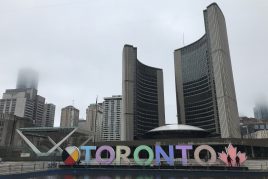
ISA Annual Convention 2019
From 26-30 March Delf Rothe attended the 60th annual convention of the International Studies Association in Toronto.
Delf was part of a roundtable on „Critical International Relations (IR) and the Politics of Climate Change“ including Stefanie Fishel, Eva Lövbrand, Anthony Burke, Robyn Eckersley, Scott Hamilton. Organized by Matt McDonald the roundtable discussed the contribution of critical IR to the current debate on the Anthropocene.
Delf furthermore presented a paper on the relation of visuality, technology and security in the Anthropocene on the panel „World Political Compositions“ and a paper on the genealogy of the Anthropocene on panel on „Genealogies of bio-technical worlds“.
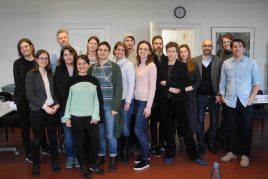
Workshop: Violent Climate Imaginaries
Researchers from the University of Hamburg and University of Lund meet at the IFSH in Hamburg to discuss research grant proposal on violent climate imagineries.
The workshop „violent imaginaries of climate change“ (VICTIM) took place on February 11th-12th 2019 at the Institute for Peace Research and Security Policy in Hamburg. Criminologists, peace researchers, linguists, science fiction writers and social scientists discussed the empirical finding that social impacts of climate change are often portrayed as violent in literature, film and science and how this lack of imagination impacts current climate politics. The University of Hamburg seed-funded the workshop. It serves as the point of departure for drafting a larger research grant proposal on imaginaries of violent climate change.
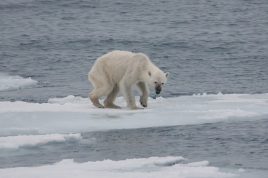
Essay on The summer of extremes 2018
On December 30, the German newspaper "Die Tageszeitung" published Delf Rothe's long-read on the 2018 summer heatwaves [in German]
The article reflects upon the impact of the extreme summer on the public discourse on climate change in Germany. It argues that it challenged the ways dominant ways of seeing climate change. Rather than as a distant threat, global warming would increasingly be perceived as a catastrophe, which is already happening.
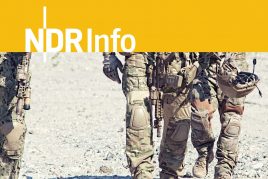
Radio Interview with NDR Info
Delf Rothe spoke on NDR Info about the potential security implications of climate change [in German].
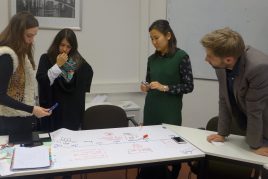
Scenario Workshop on Geoengineering Risks
Workshop on „Future Security Risks of Geoengineering”, Peace and Security Studies (M.A.)
Members of the Anthropocene-Security-Projekt Team carried out a scenario planning exercise on future security risks of geoengineering with postgraduate students of Peace and Security Studies at IFSH Hamburg on November 29th/30th. A brief documentation can be found here.
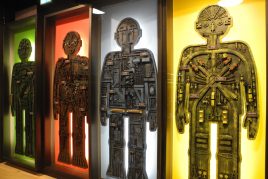
Earth System Governance 2018
Ann-Kathrin Benner and Delf Rothe presented their research on legacies of the Cold War in contemporary Anthropocene thinking at the Earth System Governance Conference in Utrecht on November 6th 2018.
The paper was part of a double-panel on the ethics of future-making in the Anthropocene organized by Eva Lövbrand, Silke Beck, Alejandro Esguerra and Henrike Knappe.
The paper abstract can be accessed here.

Paper Jellyfish Encounters
Delf Rothe presented the paper Jellyfish Encounters: The Paradox of Security in the Anthropocene at the Pan-European Conference on International Relations in Prague, September 12th-15th 2018.
The paper uses the example of a recent rise of jellyfish that threaten to take over the oceans to rethink the notion of security in the Anthropocene. It describes how jellyfish emerge as a posthuman security threat that is literally ungovernable. As jellyfish blooms can neither be mapped nor predicted, humanity increasingly relies upon extreme measures, such as jellyfish killer robots, to cope with the risks of the Anthropocene.
The draft paper is available upon request.
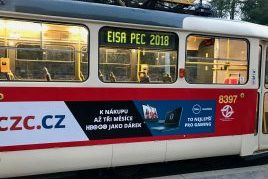
Conference Section Anthropocene Politics
Co-convened with David Chandler at the Pan-European Conference on International Relations in Prague, September 12th-15th. 2018.
Delf Rothe co-convened a section on Anthropocene politics: IR after the end of the world together with David Chandler (University of Westminster) during this year’s EISA annual conference in Prague. The section was composed of nine panels and a roundtable discussion devoted to interrogating the claims made for (and against) the Anthropocene as “the end of the world as we know it”. The speakers raised questions about notions of time and critique in the Anthropocene, environmental politics and geopolitics, the possibilities of decolonizing the Anthropocene, its nuclear origins and challenges for IR theory.
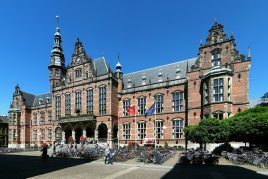
Paper Visual Resilience
Delf Rothe presented the paper Between Bending Trees and Standing Rocks: The Visual Politics of Resilience at the European Workshops in International Studies, 6-9 June 2018 in Groningen.
The paper was part of the workshop Doing Visual IR convened by Jonathan Luke Austin and Stephanie Perazzone. The workshop brought together 20 international scholars to discuss the role of visuality and visual methods in the study of world politics. In his contribution, Delf studied how images are used to make sense of resilience and how visual methods such as mapping, drawing or sensing are applied in resilience promotion projects.
The draft paper is available upon request.
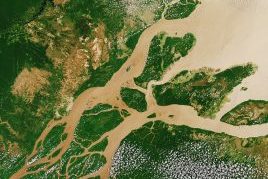
New Publication
Rothe, Delf and David Shim. 2018. Sensing the ground: On the global politics of satellite-based activism. Review of International Studies, 44(3), 414-437.
In recent years, satellite imagery, previously restricted to the defence and intelligence communities, has been made available to a range of non-state actors as well. It is often said that the increasing availability and applicability of remote sensing technologies has contributed to the rise of what can be called ‘satellite-based activism’ empowering non-state groups to challenge state practices of seeing and showing. In this article, we argue that NGO activism is not challenging the sovereign gaze of the state but, on the contrary, actually reinforcing it.
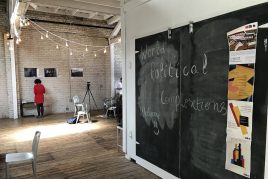
Workshop Contribution Anthropocene Compositions
Contribution to the workshop World Political Compositions convened by Jonathan Luke Austin and Anna Leander on the 3rd of April 2018, as a side-event of the 2018 International Studies Association meeting.
The World Political Compositions project draws together contributions around the concept of composition, in the aesthetic sense of the term, and the five traditional senses of human perception, in order to address the question of how we make sense of the international. In his contribution, Delf Rothe took up this question and asked how we make sense of the Anthropocene. He stressed the role of non-human actants, including remote sensors, space infrastructures, computer models, meteorological databases etc., in practices of world-making.
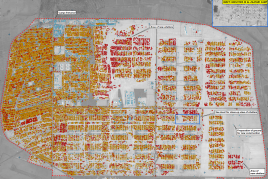
Paper A Tale of Two Camps
Delf Rothe presented the paper A Tale of Two Camps: Remote sensing migration and the securitization of physical disorder in refugee camps at the ISA Annual Convention 2018 in San Francisco.
The paper that Delf co-authored with his colleagues Christiane Fröhlich (GIGA Hamburg) and Miguel Rodriguez-Lopez (University of Hamburg) discusses the merits and pitfalls of remote sensing methodologies in the study of refugee camps. The paper was part of a panel on Sensing the Global: The Role of Satellite Technology in the Making of Global Actors, Practices, and Rules that brought together scholars working on satellite remote sensing with practitioners and satellite image analysts.
The draft paper is available upon request.
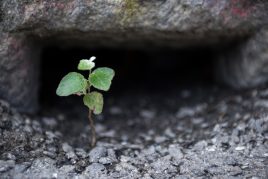
Paper Growing Resilience
Delf Rothe presented the paper “Growing Resilient: Human-plant relations and the ‘hortomentality’ of resilience in the Anthropocene" at the ISA Annual Convention 2018 in San Francisco.
The paper analyzes different policy proposals to increase urban resilience through city forestry and urban gardening. The paper was presented at the panel discussion The Vegetal Moment in Global Politics? Vegetal Ontologies of Presence and Resistance in the Anthropocene that was co-convened by Charlotte Heath-Kelly and David Chandler.
The draft paper is available upon request.
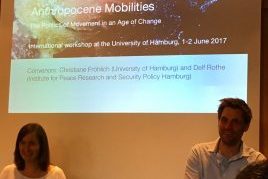
Anthromob Workshop
On June 1st and 2nd 2017, the international workshop “Anthropocene Mobilities – The Politics of Movement in an Age of Change” took place at the University of Hamburg.
The workshop organized by Delf Rothe (IFSH) and Christiane Fröhlich (University of Hamburg) brought together scholars working in the field of environmentally-induced migration with theoretical thinkers of the Anthropocene. The workshop initiated a fruitful dialogue on the implications of the Anthropocene for human and non-human mobilities. A special issue to be published by Mobilities in 2019 as well as an interactive web platform (www.anthromob.space) are the preliminary results of these discussions.

New Publication
Global Security in a Posthuman Age? IR and the Anthropocene Challenge.
Delf Rothe published a chapter in the recent edited volume Reflections on the Posthuman in International Relations: The Anthropocene, Security and Ecology edited by Clara Eroukhmanoff and Matt Harker. Rothe’s chapter discusses the implications of the Anthropocene for global security and the discipline of International Relations. The volume is available in paperback and as open access E-book

Violent Climate Imaginaries (VICTIM)
Delf Rothe (IFSH) and Johannes Stripple (University of Lund) receive a seed funding grant by the Universtität Hamburg and the University of Lund
The seed funding was granted to establish an interdisciplinary research network on the topic of Violent Climate Imaginaries: Science – Fiction – Politics. The interdisciplinary project VICTIM studies how ‚violent climate imaginaries‘ are produced and circulated in science, popular culture, and security politics. It asks how stories of dangerous climate change travel between these domains and how they influence policy-makers and practitioners.
A first project-workshop with participants of both universities is going to take place on February 11th-12th 2019 at the IFSH Hamburg.
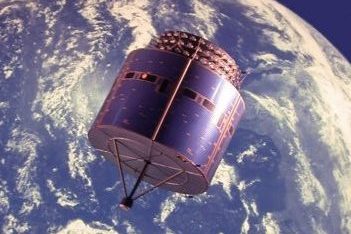
New Blog Post
Making the Invisible Visible: Satellites, Visual Technologies and Environmental Security, post by Delf Rothe at the Security Dialogue Author’s Blog, posted December 10, 2017.
The blog post offers a brief and accessible summary of Delf Rothe’s recent article in Security Dialogue, Seeing like a Satellite: Remote Sensing and the Ontological Politics of Environmental Security. It traces how the understanding of environmental security co-evolved in line with technological developments in the field of satellite technologies. The latest stage of this development is the emergence of geospatial big data as a new form of preventing and governing future environmental threats and risks.
© All rights reserved anthropocene-security.org

